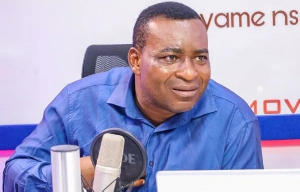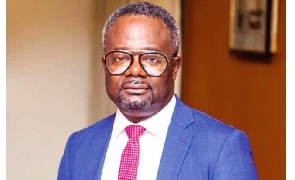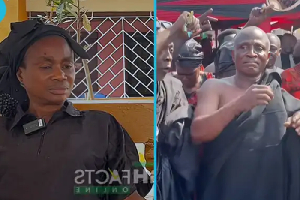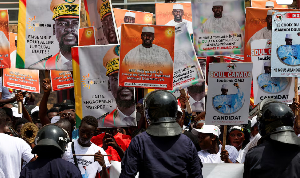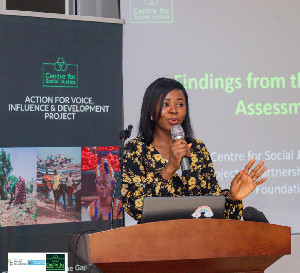The notion that all politicians are the same once they are in their comfort zones is somewhat sophistic, so to speak.
“When all parties turn out to be the same once in power, people lose faith in all parties, and ultimately in democracy.”
Unlike Ghanaian ‘celebrities’ who are gleefully endorsing their preferred presidential candidates for the forthcoming general elections, the British comedian, Russel Brand, is reported to have besought his admirers to stay away from voting in order to “starve [politicians] of consent”.
In Brand’s opinion, “there is no point in voting for any politician, as they all ultimately behave the same way once they’re in office”.
Similarly, the Italian funnyman Beppe Grillo – had also contended some time ago that politicians are all corrupt and incompetent.
Grillo, however, propounded that the way forward is not to stay away from elections but instead to elect more “non-politicians’ into office”.
Well, Grillo may be a comedian, but he is not without reflective thinking skills, judging from his pragmatic counsel.
However, I am besotted over his non-politicians observation. Did he mean to say a semicircle of mediocre politicians? May be he meant to say so.
Take Ghana for example, who would qualify as non-politicians in the 2016 presidential race?
We are told that about seventeen candidates have so far filed for the presidential slot in the forthcoming general elections and which of them can be classified as non-politicians?
Could we then say that apart from the presidential aspirants of NPP, NDC, CPP, PPP and PNC, the rest, including Madam Akua Donkor, Hassan Ayariga, Kofi Apaloo etc., are non-politicians?
Are we to vote for any of the aforementioned individuals according to the comedian Grillo?
In fact, in Ghana’s perspective, it would be a big joke to have a semicircle of undistinguished politicians like Madam Akua Donkor, Hassan Ayariga or Kofi Apaloo and their likes as president in our quest to advance as a nation.
All the same, are some of the mainstream political parties like NDC have been able to advance our fortunes meaningfully? The answer is big no.
In any case, I would like to believe whichever way you may analyse the situation, it appears as a rejection of “mainstream” politics by aggrieved electorates.
Apparently, this feeling of indignation with the current political dynamics across the globe is something shared by many Ghanaian electorates.
All the same, in my view, anti-politics is not the way forward, but electorates should rather look beyond the narrow political lines and assess the bigger picture.
That is by thinking about the way we can develop exponentially; which political party can take us forward as a nation and more so the right political party that won’t squander our resources.
I remember my sister once put it to me: “aren’t all politicians the same?” “So why should I change from one to another?”
However, I attempted to address my sister’s specious disposition. I retorted: “you are wrong sister, because politicians have different levels of temperament, competence, experience, knowledge, skills and abilities so they are never the same”.
In fact, there are enough admissible evidence to counter my sister and her likes who insist that politicians are the same.
Take, for instance, President Kufuor who moved Ghana from the Highly Indebted Poor Country (HIPC) status to a Lower Middle Income status when he took over from former President Rawlings in 2001.
During the year 2001, “debt as a percentage of the GDP was not only unsustainably high and crippling but also deprived Ghanaians from money which could have been used for needed developmental and social projects”.
The benefits of the HIPC were “unprecedented during the Kufuor’s regime from (2001-2008). Microeconomic indicators begun to stabilize and Ghana’s debt stock was significantly reduced by about $4 billion within that period”.
“There were Rapid infrastructural developments as well as social and policy reforms”. “Ghana was then elevated from a HIPC economy to a middle income economy under the Kufuor administration” (Mutaka Alolo, 2012).
“By the end of 2008, Ghana's economy had been quadrupled to US$ 16 billion, a period of eight years under the NPP”. “The average GDP growth of the NDC from 1993-2000 was 3.8% while that of the NPP from 2001-2008 was5.2% with economic growth reaching 6.3% in 2007” (Daily Guide, 2016).
Disappointingly, however, in the last seven and half years, President Mahama and his NDC government have undone all the good foundation laid by President Kufuor and his NPP Party.
For example, according to Dr Bawumiah, in the last seven years alone under this NDC government, Ghana’s total debt has ballooned from GH¢9.5 billion to a projected GH¢110 billion by the end of September 2016.
This means that 90% (i.e. GHC99.5 billion) of Ghana’s total debt since independence has been accumulated under this NDC government from 2009-2015 i.e. the last seven and half years.
As a matter of fact, it would be most unfair to put for instance, Dr Osagyefo Kwame Nkrumah and J. J. Rawlings in the same basket and compare their achievements.
For if nothing at all, Dr Nkrumah was a chivalrous industrialist who built hundreds of factories, but only for President Rawlings to off load all to individuals through his somewhat infelicitous Economic Recovery Programme.
In the same vein, it would be boundlessly unconscionable to put President Kufuor and President Mahama on the same pedestal in terms of the implementation of social interventions.
For if nothing at all, President Kufuor and his NPP government pragmatically introduced the free Maternal Care, the School Feeding Programme, the National Health Insurance Scheme, the Mass Transport System, the Livelihood Empowerment Against Poverty (LEAP), the National Youth Employment Programme, now known as GYEDA, and many other social interventions.
My dearest reader, would you be sincere enough and name just a single social intervention that has been implemented by President Mahama and his NDC Party who claim to be social democrats?
Obviously, it is not entirely right for anyone to assume that all politicians are the same once they are in their comfort zones and therefore it is an exercise in futility to go out there and vote.
Lest I forget, if you refused to go out there and vote massively for a positive change, someone else will elect ‘a semicircle’ of corrupt and incompetent representatives who will only continue to sink the nation deeper and deeper into the mire.
K. Badu, UK.
Opinions of Sunday, 2 October 2016
Columnist: Badu, K


